Related Research Articles
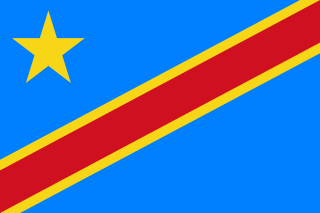
The Democratic Republic of the Congo (DRC), also known as Congo-Kinshasa, DR Congo, the DROC, the DRC, or simply either Congo or the Congo, and formerly Zaire, is a country in Central Africa. It is, by area, the largest country in sub-Saharan Africa, the second-largest in all of Africa, and the 11th-largest in the world. With a population of around 105 million, the Democratic Republic of the Congo is the most populous officially Francophone country in the world, as well as the fourth-most populous country in Africa and the 15th-most populous country in the world. It is a member of the United Nations, Non-Aligned Movement, African Union, and COMESA. Since 2015, the Eastern DR Congo has been the site of an ongoing military conflict in Kivu. The capital and largest city is Kinshasa.

The president of the Democratic Republic of the Congo, is the head of state of the Democratic Republic of the Congo and commander-in-chief of the armed forces.
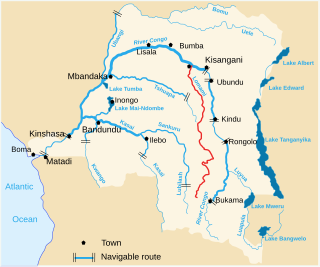
The Lomami River is a major tributary of the Congo River in the Democratic Republic of the Congo. The river is approximately 1,280 km (800 mi) long. It flows north, west of and parallel to the upper Congo.
The Congolese franc is the currency of the Democratic Republic of the Congo. It is subdivided into 100 centimes.
Lamba may refer to:
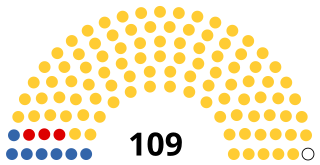
The Senate is the upper house of the Parliament of the Democratic Republic of the Congo. The senate was established in 1960, abolished in 1967 and re-established in 2003.

The Parliament of the Democratic Republic of the Congo consists of two chambers:
The Bemba belong to a large group of Bantu peoples mainly in the Northern, Luapula, Muchinga, and the Northern part of Central Province of Zambia. The Bantu also belong to the Copperbelt Provinces of Zambia who trace their origins to the Luba and Lunda states of the upper Congo Basin called Kola, in what became Katanga Province in southern Democratic Republic of the Congo. The Bemba entered modern-day Zambia through crossing the Luapula River at Chipya in the Senior Chief Matanda's Chiefdom in Mansa, Luapula Province and that Chief Matanda and his Ushi people were the first to come into Zambia by the year 1328 from Kola. The collection of ethnicities known as Bemba have a ruling class called Abena Ng'andu. This clan traces its ancestry to Mbemba Nshinga who ruled Kongo from 1509–1543. Mbemba was called King Afonso l by the Portuguese whom he hosted in his kingdom for many years. They are one of the larger ethnic groups in Zambia. (A few other ethnic groups in the Northern, Luapula, and Copperbelt provinces of Zambia speak languages that are similar to Bemba but are not necessarily the same. For example, although the Lamba have the same roots as the Bemba, they never relied on the Bemba aristocracy for leadership. Indeed the Bemba people are not strictly indigenous to the Copperbelt Province, having rejoined the Lamba in that province in the 1930s when they went their in large numbers in search of employment opportunities brought about by the opening of large scale copper mines. In contrast members of the Bisa royal family are almost all descendants of Chitimukulu, as are many members of the Swaka and Lala aristocracies. Bemba history is a major historical phenomenon in the development of chieftainship in a large and culturally homogeneous region of central Africa.

Kasumbalesa is a border town in the Democratic Republic of the Congo. It sits across the international border from the much smaller town of Kasumbalesa, Zambia.
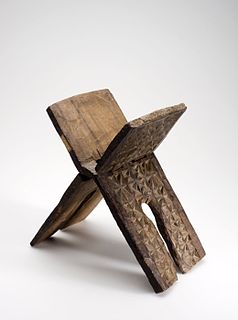
Islam is a minority religion within the Democratic Republic of the Congo where the large majority is affiliated to various Christian denominations and sects. It was first introduced to the Congo basin from the East African coast during the Arab slave trade in the 19th century and remains largely concentrated in parts of Eastern Congo, notably in Maniema Province. Most Congolese Muslims are Sunni and follow the Shafi‘i and Maliki school of jurisprudence (fiqh). Though estimates vary, it is generally believed that between one and 10 percent of the country's population identify as Muslim.
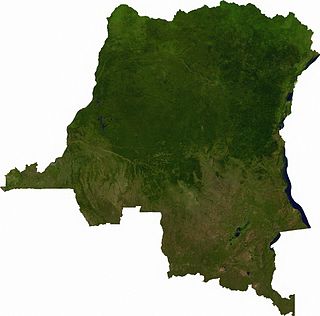
Articles related to the Democratic Republic of the Congo include:
Lamba is a language found in Zambia and is commonly spoken in the Copperbelt. There are about 210,000 native speakers in the northern parts of Zambia and southern fringes of the Democratic Republic of the Congo. Lamba is also spoken in Lusaka, mainly because many speakers have migrated there for jobs. Lamba is a Bantu language. Depending on who does the counting, Zambia has between 42 and 78 local languages besides English – see Languages of Zambia for further details. Some people might say Lamba is a dialect of Bemba. Though the two languages share many words, they are not as close as say Cockney and Haitian Creole are to English or French.

The 2008 Lake Kivu earthquake shook several countries in Africa's Great Lakes region at 07:34:12 (GMT) on February 3. It measured 5.9 on the moment magnitude scale. The epicentre was 20 kilometres (12 mi) north of Bukavu at Lake Kivu in the Democratic Republic of Congo.

The Republic of the Congo, also known as Congo-Brazzaville, the Congo Republic or simply either Congo or the Congo, is a country located in the western coast of Central Africa. The country is bordered to the west by Gabon, to its northwest by Cameroon and its northeast by the Central African Republic, to the southeast by the DR Congo, to its south by the Angolan exclave of Cabinda and to its southwest by the Atlantic Ocean. French is the official language of the Republic of the Congo.

Platylesches lamba, the Neave's banded hopper, is a butterfly in the family Hesperiidae. It is found in Ivory Coast, Ghana, Cameroon, the Democratic Republic of the Congo (Shaba), western Uganda, Malawi and northern Zambia. The habitat consists of woodland and open places in the forest zone.
Lamba people are a Bantu ethnolinguistic group mainly located in the Central, Copperbelt, and North-Western provinces of Zambia. Lamba people speak the Lamba language, with Lamba and Lima the major dialects recognized.

The 2018 Équateur province Ebola outbreak occurred in the north-west of the Democratic Republic of the Congo (DRC) from May to July 2018. It was contained entirely within Équateur province, and was the first time that vaccination with the rVSV-ZEBOV Ebola vaccine had been attempted in the early stages of an Ebola outbreak, with a total of 3,481 people vaccinated. It was the ninth recorded Ebola outbreak in the DRC.

Busengo is a settlement in the North Kivu Province of the Democratic Republic of the Congo. The town sits across the international border from Busengo, Uganda.
Protestant University in the Congo, is a university in the Democratic Republic of the Congo, affiliated with the Protestant Church which is known in the country as the Church of Christ in the Congo.
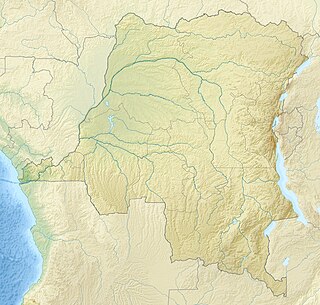
Nzilo Hydroelectric Power Station is an operational hydropower plant in the Democratic Republic of the Congo, with installed capacity of 100 megawatts (130,000 hp). It is operated by the Congolese electricity utility company, Société Nationale d'Électricité (SNEL).
References
- ↑ "Latitude and longitude of Lamba, Democratic Republic of the Congo". latitude.to. Retrieved November 12, 2018.
Coordinates: 5°13′36″S18°57′59″E / 5.2267°S 18.9664°E